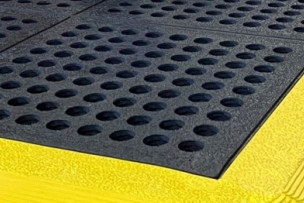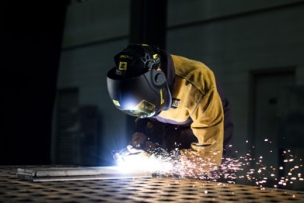“The number of single-use disposable gloves used globally every year runs into the hundreds of billions, and most of those items end up in a landfill at some point,” he notes. And the waste tally is likely to increase as PPE manufacturers continue to produce products as the pandemic continues.
Read more about reopening in the MSC Direct Reopen Safely Guide
Thankfully, Showa has developed a solution to combat waste.
Showa’s gloves with Eco Best Technology (EBT) are engineered for accelerated biodegradation in biologically active landfills. According to Showa, independent certified laboratories performing long-term landfill biodegradation testing (according to ASTM D5526-12) reported that Showa's gloves with EBT achieved 82 percent biodegradation in only 386 days, while gloves without EBT achieved only 1.9 percent biodegradation over the same period.
EBT was first introduced in 2012 and now extends to 12 Showa gloves on the market.
“We want to focus on adding to that number, so it doesn’t end with these 12 styles,” Piotrowski says. “Our goal in the next two to three years is to have as many products as possible within the Showa portfolio with this biodegradable technology.”
Emphasis on Research and Development
Showa’s EBT technology is characteristic of a company that’s always committed to developing the most advanced technologies through investments in research.
This 66-year-old glove company, which is responsible for 58 patents, developed the first soft nitrile glove and was the first company to produce PVC gloves for commercial uses. Other notable company inventions include:
- The world’s first wrinkle-finished, natural rubber-coated glove in 1960
- The world’s first disposable nitrile glove in 1991
- The world’s first accelerator-free disposable glove in 2003
- The world’s first biodegradable disposable nitrile glove in 2012
Based in Japan, Showa maintains a strong commitment to U.S.-based manufacturing, Piotrowski says. Most of the company’s glove styles are manufactured in Asia and Central America, but a massive multimillion-dollar expansion project is currently underway at the company’s Fayette, Alabama, plant to increase production capabilities on single-use-style gloves in the United States.
The company mainly serves the food and manufacturing sectors. And, as with many other PPE providers, the onset of the COVID-19 crisis drove up orders for Showa’s gloves, Piotrowski says. Orders for April and May were very strong, he adds, but with a strong inventory, the company was able to meet the rising demand.
“Unfortunately, now we’re running low on inventory in some of our styles, or some of them are on back order simply because the demand for PPE globally has skyrocketed,” Piotrowski says. “But on average we hold one to two months of inventory on our shelves.”
Read more about Showa’s Eco Best Technology
Piotrowski says the COVID-19 crisis has presented an opportunity for the company to strengthen relationships with key partners and begin relationships new customers. Given the potential issues with the global supply chain, some are looking to purchase PPE from local U.S. producers, he says, noting that very little of what Showa produces is subcontracted out to another company, and so the company has a degree of vertical integration that gives it control over the supply chain in some cases down to the raw materials. This gives some degree of comfort to those customers who now prefer to buy from U.S.-based sources.
“I wouldn’t say it’s something that all of our customers are coming to us for, but it is definitely on the lips of a lot of customers,” he says. “Some customers that may have preferred an overseas provider that sells at a lower cost are showing interest now in the U.S.-made products that Showa produces,” he adds.
While it may cost a little bit more to buy from a U.S. producer, customers are starting to see the value of relying on producers who are closer to home because they don’t have to wait three months for an order to arrive from overseas, and a provider such as Showa can be nimble and supply customized small-batch orders, Piotrowski notes.
The ‘Cadillac of Gloves’
Another of Showa’s key strengths is its commitment to quality, says Piotrowski, noting that the company has a reputation for producing the “Cadillac of gloves.”
“We are not a generic low-cost manufacturer,” he says. “We focus on product quality, performance and value above all else.”
At the foundation of this commitment to quality is a dedication to research and development, Piotrowski says.
“We spend millions each year on research and development, and we have 100-plus people in the R&D center in Himeji, Japan,” he says. “You would never think that four fingers and a thumb could have so much technology devoted to it.”
Showa’s corporate saying is “always innovating, never imitating,” he adds.
“We’ve been the inventors of so many glove styles over the past four decades,” he says. “Our ability to understand industry trends and react to them with really unique products is due to our dedication to research and development. We always want to be leading the pack; we want to be innovators, not imitators.”




Talk to Us!
Sir,
I am venkata Krishna,i need to plan manufacturing unit of biodegradable gloves nitrile and letex.pls give me contact number details.
41Leave a reply
Your email address will not be published. Required fields are marked *